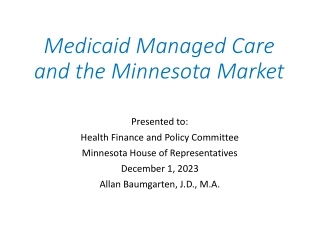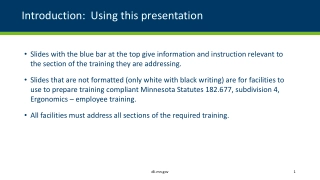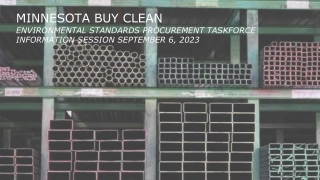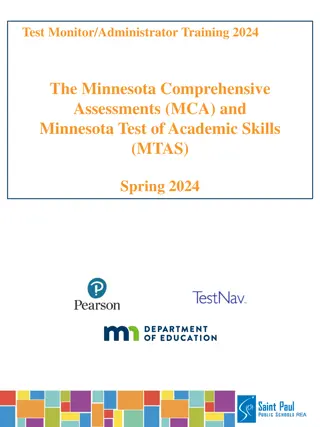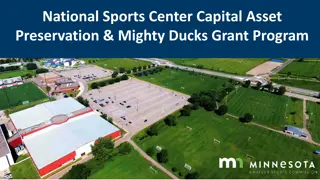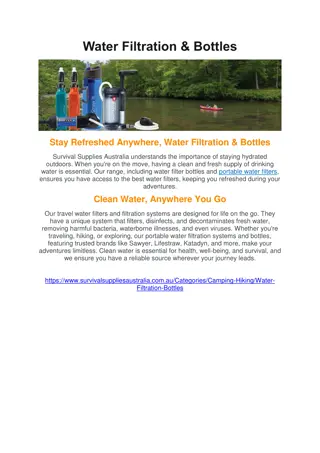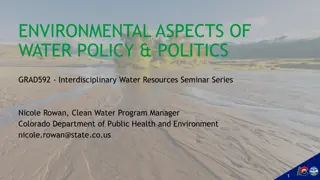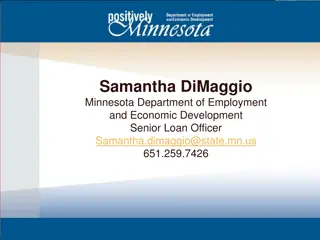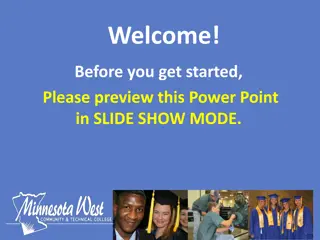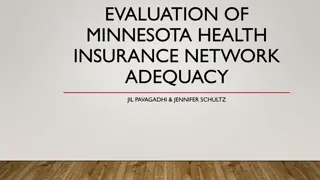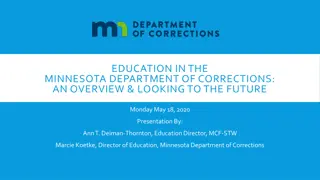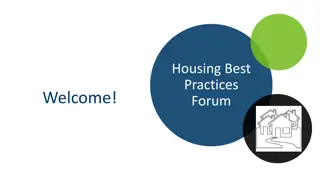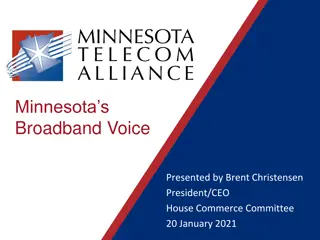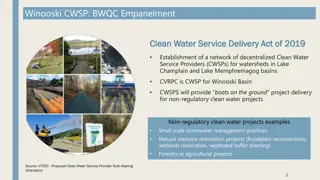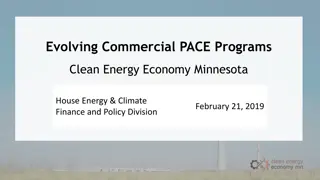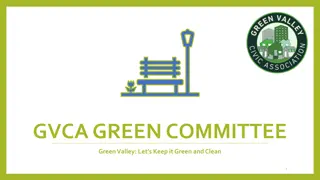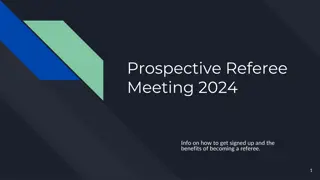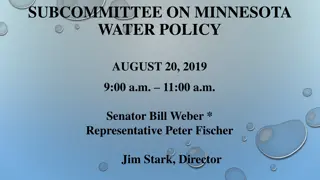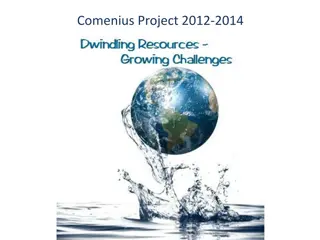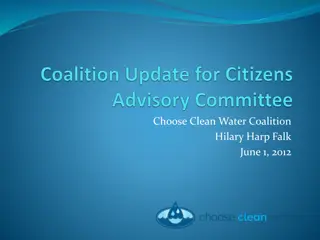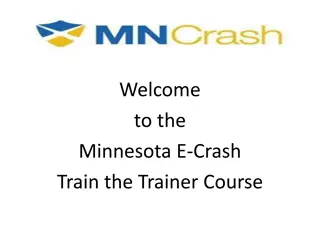Clean Water Minnesota
Clean Water Minnesota Learning Community Summary & Evaluation findings on stakeholder perceptions, priorities, key challenges, strategies, and stakeholder engagement across sectors. The engagement process, research overview, and resulting strategies are discussed, emphasizing the importance of building relationships and understanding water issues. Key findings show priorities such as aging infrastructure, pollution concerns, and the need for unified voices in addressing water challenges.
Download Presentation

Please find below an Image/Link to download the presentation.
The content on the website is provided AS IS for your information and personal use only. It may not be sold, licensed, or shared on other websites without obtaining consent from the author.If you encounter any issues during the download, it is possible that the publisher has removed the file from their server.
You are allowed to download the files provided on this website for personal or commercial use, subject to the condition that they are used lawfully. All files are the property of their respective owners.
The content on the website is provided AS IS for your information and personal use only. It may not be sold, licensed, or shared on other websites without obtaining consent from the author.
E N D
Presentation Transcript
Clean Water Minnesota Learning Community Summary + Evaluation Presented to the Subcommittee on Minnesota Water Stephanie Devitt, M.P.P. Owner, Principal Consultant 710 South Second Street, Ste. 400 Minneapolis, MN 55401 stephanie@sdkcommunications.com ph: 612 437 0899 sdkcommunications.com Tuesday, August 20, 2019
Stakeholder Engagement Process Research: Stakeholder perceptions of water priorities Our process: Clean Water Minnesota The road ahead: Stakeholder priorities 2
Research Stakeholder Perceptions of Water Priorities
Research Overview Same questions: How do you think about water in MN? 22 in-depth interviews Diverse sectors 4
Key Findings Priorities: Aging Infrastructure, Ground/ Surface Pollution Few Understand Outside Greater MN Challenge: Aging Infrastructure Agriculture Double Bind Ag Environment Local Gov. 5
Our Resulting Strategies Speak With A Unified Voice Widen The Tent Create Space For Relationships, Understanding 6
Clean Water Minnesota A learning community designed to build relationships, understanding 7
Learning Community Engaging Across Sectors SECTORS PARTICIPATING IN CLEAN WATER MINNESOTA Other 4% Agriculture 11% State Government 27% Equity 4% Health 4% Rural / Community Development 4% Small Business 4% Local / Regional Government 11% Environmental NGO 31%
Relationships Are A Motivator Q: What were your goals for participating in the learning community? 96 % 100 85% 90 80 70 59% 60 50 41% 40 33% 30 20 10 0 New relationships with people across sectors Deepen relationships with people across sectors that touch water New information about water issues A deeper Other understanding of why water impacts me and my work 9
Participants Rated the Process Worthwhile 4% 29% 67% Excellent Good Fair 10
Fresh Approaches To Water Issues Stood Out Survey Feedback: Ranking Clean Water Minnesota Sessions 100% 90% 80% 70% 60% 50% 40% 30% 20% 10% 0% Mankato / PCA Discussion Anthony Farms Tour Mill Creek Dairy Cleveland, MN Cold Springs, MN Forever Green N/A Not Valuable Somewhat Valuable Valuable Extremely Valuable 11
Participants Stand-Out Lessons We are too fragmented to be effective right now . We need to find a way to remove power structures and create a common ground. Minnesota ag land is rented. Looking at success in terms of decreasing inputs to increase profits, rather than the traditional growth model, can help conservation land management be more successful. Small towns are stretched for people and people are on the landscape because they love it. 12
Participants Biggest Take Aways The scale of change needed, and the importance of equity in decision making. People have a lot more in common than we think. We just need to know how to better communicate our differences and shared goals if we are going to be successful. Our existing government systems need a new paradigm. We need to listen and not assume we have answers since we don t know the question. There is a real disconnect between urban and rural folks understanding water issues and solutions to those issues. 13
The Road Ahead Stakeholder Priorities 14
Perceived Barriers To Clean Water What do you see as the biggest barrier to clean water? 45 40 35 30 25 20 15 10 0 0 0 5 0 Lack of clear, scalable policy goal Lack of political will Farm bill Lack of shared stakeholder understanding of barriers Lack of public understanding Lack of policy maker understanding Other All NGOs State Agencies 15
Perceived Opportunities For Clean Water Policy What do you see as the greatest asset or opportunity for advancing clean water? 50 40 30 20 10 0 0 0 0 Coordinaging across water stakeholders (agencies, NGOs, etc.) Public Engagement Uniting for federal policy change Statewide advocacy coordination Policy maker engagement Other All NGOs State Agencies 16
Support Needed To Achieve Success What Support Do You Need To Play The Role You See For Yourself? 50 45 40 35 30 25 20 15 10 5 0 0 Peer group to call on Opportunities to consult with outside experts Access to information All of the above All NGOs State Agencies 17
Perceived Role For Funders What Role Would You Like To See McKnight Play? 50 45 40 35 30 25 20 15 10 5 0 Convener Supply coordination across sectors Funder of inspired projects Other All NGOs State Agencies 18
Key Lessons of the Learning Community Assets For Future Work Stories Fresh Relationships Perspectives 19
Key Lessons of the Learning Community Continued Success Will Require Deepen Trust With New Relationships Deepen Connections Between NGOs, Public Sector 20
Questions? 21


